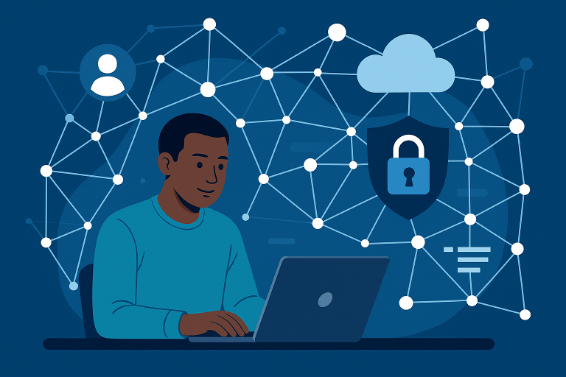
From Accra to Nairobi and Mexico City to Mumbai, governments and businesses are digitising services to boost efficiency and reach more citizens. Mobile banking, e-governance platforms, and cloud-hosted data are transforming economies. But this progress is colliding with a surge of cyberattacks that are growing more sophisticated and costly.

Ransomware is now one of the most dominant threats worldwide. Verizon’s 2025 Data Breach Investigations Report shows it drives the majority of system-intrusion breaches. Sophos reports that about two-thirds of surveyed organisations globally faced ransomware in the past year. In Africa, INTERPOL found a sharp rise in ransomware cases in 2024, with South Africa, Egypt, and Nigeria topping detection charts.
In India, 64 per cent of organisations were hit last year, down slightly from 73 per cent but with higher recovery expenses. Mexico’s federal agencies and energy companies have also faced crippling ransomware events. In the United States, breaches cost an average of more than 10 million dollars, but stronger response capabilities are limiting the damage compared to less-prepared economies.
Attacks in developing nations
The cyber landscape in emerging economies has weaknesses that sophisticated attackers exploit. Many agencies and companies depend on outdated IT infrastructure with unpatched vulnerabilities. Budget constraints often delay hardware refreshes and software upgrades. Skilled cybersecurity professionals are in short supply, and when they leave, institutional knowledge disappears.
Regulations exist but are still maturing. Ghana’s Cybersecurity Act and Nigeria’s Data Protection Act set frameworks but struggle with full enforcement. Public awareness is uneven, leaving citizens and employees vulnerable to phishing emails and fake mobile payment requests. Remote work has expanded faster than secure identity controls, leading to poorly protected devices on critical networks.
Supply chains create additional exposure. A bank might enforce strong security, but its outsourced IT contractor may not, creating a weak entry point. Meanwhile, cybercriminal groups use automation and AI to craft convincing phishing campaigns and launch ransomware at scale. These factors combine to make developing markets attractive targets.
Real-world consequences
Attacks have disrupted ministries, paralysed payment systems, and delayed public services. In Mexico, ransomware incidents have affected government procurement and oil sector logistics. In Africa, transport and statistics agencies have been compromised, eroding public trust. India has faced large-scale fraud and data theft as cybercriminals exploit its huge digital identity ecosystem. Even where ransom demands are lower than in advanced economies, the relative cost of recovery is devastating for health services, schools, and local governments.
Steps already taken and gaps that remain
Ghana has created the Cyber Security Authority (CSA), which licenses service providers, regulates critical information infrastructure, and coordinates through CERT-GH. Public advisories and simulated cyber drills have begun to raise readiness. Kenya’s National Cybersecurity Strategy and Computer Misuse and Cybercrimes Act have strengthened legal powers and built a multi-agency response network. Nigeria has launched the Nigeria Data Protection Commission, imposing fines on violators and encouraging compliance.
These steps show progress but remain unevenly implemented. Many small and medium enterprises in Ghana and Nigeria still lack formal incident response plans. Agencies often lack the budget to adopt advanced detection tools. Awareness campaigns have begun, but do not yet reach every level of the workforce or citizen population.
How Artificial Intelligence can tilt the balance
Artificial Intelligence is emerging as a key defender. AI-powered security systems analyse massive volumes of data in real time, learning normal user and network behaviour to flag anomalies. If a ransomware attack starts encrypting files, AI can detect the unusual activity and shut it down before it spreads widely. AI email filters recognise phishing patterns more accurately than traditional rule-based systems, while dark-web monitoring tools powered by AI alert organisations when stolen credentials appear for sale.
In infrastructure security, AI helps identify misconfigured servers, exposed databases, and vulnerable IoT devices before criminals find them. Predictive analytics allow security teams to fix weaknesses before exploitation. Yet AI must be managed carefully. IBM’s 2024 analysis warned that uncontrolled “shadow AI” can increase risk and breach costs. Organisations need clear policies for approving and monitoring AI tools, so they enhance security rather than undermine it.

Practical mitigation strategies
Emerging economies can reduce risk significantly with disciplined steps. Enforcing multi-factor authentication across all critical systems dramatically cuts account takeovers. Network segmentation prevents attackers from moving freely once inside. Regular vulnerability scanning and prompt patching close easy entry points. Reliable backups, with at least one copy offline, allow organisations to recover without paying ransom.
AI-driven detection and automated response can shorten the time between intrusion and containment, lowering cost and impact. Training employees and the public to spot phishing attempts and handle sensitive data safely reduces the human error that attackers exploit. Governments should tie technology procurement to security standards, ensuring vendors maintain patchable, well-monitored systems.
Cross-border cooperation among African nations and with global partners can help track cybercriminal groups and stop money-laundering networks that support ransomware. Insurance markets can also reward better practices, encouraging investment in segmentation, backups, and AI-enabled monitoring.
Building a culture of resilience
Technology alone will not solve the challenge. A culture of security is essential. Employees must feel empowered to report suspicious activity without fear of punishment. Boards and senior leaders need to see cybersecurity as a core business risk, not just an IT issue. Public-private partnerships can improve threat intelligence sharing and crisis response.
Ghana has begun this journey, but the gap between policy and practice must close. The same is true across Africa, India, and Mexico. Nations that build skilled cybersecurity workforces, invest in rapid detection, and use AI responsibly can change the economics of cybercrime. The cost to attackers rises when defences respond quickly and backups make ransom payments unnecessary.
Looking ahead
Emerging markets have a rare opportunity to leapfrog legacy security approaches by embracing modern tools and governance now. Laws are in place, national CERTs are active, and global awareness of ransomware is at an all-time high. The next step is action: deploying AI-driven defences, enforcing identity controls, educating users, and coordinating responses across borders.
Cybercriminals target the easiest wins. If Ghana, other African countries, and developing economies close the gaps, they can protect their digital futures, attract investment, and keep essential services running even under attack. The choice is clear: invest in resilience today or pay the far higher price of disruption tomorrow.
- President Commissions 36.5 Million Dollars Hospital In The Tain District
- You Will Not Go Free For Killing An Hard Working MP – Akufo-Addo To MP’s Killer
- I Will Lead You To Victory – Ato Forson Assures NDC Supporters
Visit Our Social Media for More




